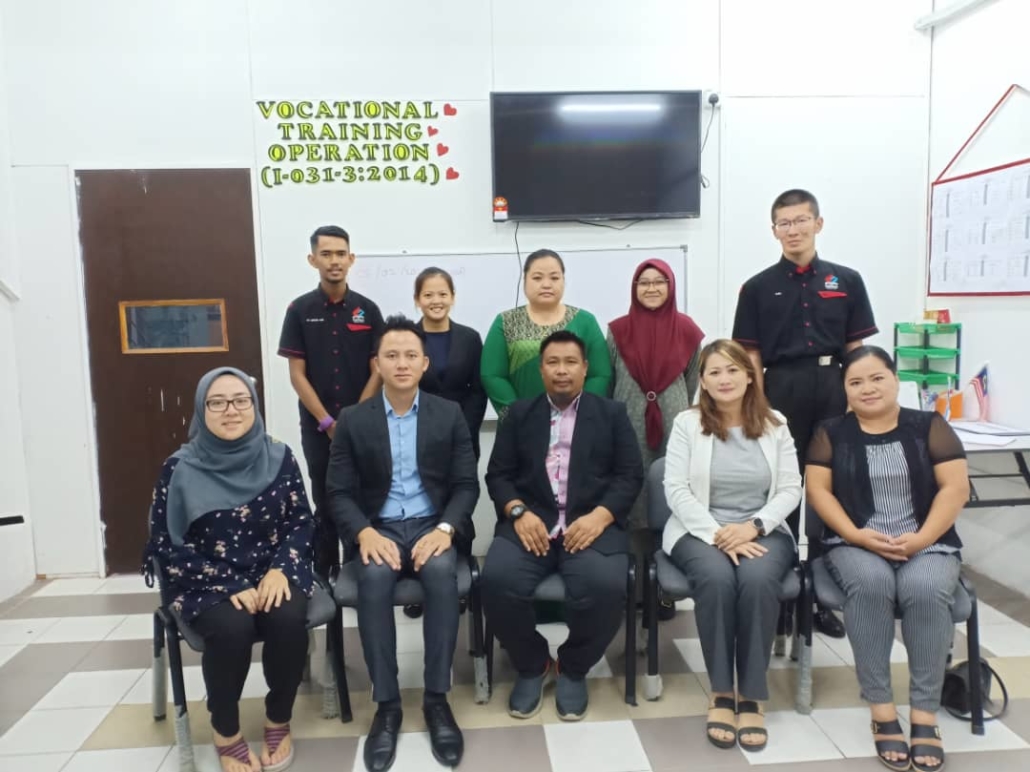



Dari Kiri: Hafizezahneda, Pau Zhang fah, Salfarina dan Remysta
Kskill Training Centre telah melawat salah satu peserta Vokasional Training Operation(VTO) di Sarawak Skills and Development Centre/PPKS Miri, Sarawak. Berkesempatan juga berbincang tentang beberapa perkara berkaitan kemahiran yang mungkin akan memanfaatkan kedua-dua Pusat Bertauliah. Tahniah juga kepada peserta dan diharapkan akan terus memperbaiki dan meningkat kemahiran yang sedia ada.
Stephane Kasriel, Upwork CEO Published 8:36 AM ET Wed, 31 Oct 2018 Updated 11:08 AM ET Thu, 8 Nov 2018 CNBC.com
Twenty million students started college this fall, and this much is certain: The vast majority of them will be taking on debt — a lot of debt.
What’s less certain is whether their degrees will pay off.
According to the survey Freelancing in America 2018, released Wednesday, freelancers put more value on skills training: 93 percent of freelancers with a four-year college degree say skills training was useful versus only 79 percent who say their college education was useful to the work they do now. In addition, 70 percent of full-time freelancers participated in skills training in the past six months compared to only 49 percent of full-time non-freelancers.
The fifth annual survey, conducted by research firm Edelman Intelligence and co-commissioned by Upwork and Freelancers Union, polled 6,001 U.S. workers.
This new data points to something much larger. Rapid technological change, combined with rising education costs, have made our traditional higher-education system an increasingly anachronistic and risky path. The cost of a college education is so high now that we have reached a tipping point at which the debt incurred often isn’t outweighed by future earnings potential.
Yet too often, degrees are still thought of as lifelong stamps of professional competency. They tend to create a false sense of security, perpetuating the illusion that work — and the knowledge it requires — is static. It’s not.
“Too often, degrees are still thought of as lifelong stamps of professional competency. They tend to create a false sense of security, perpetuating the illusion that work — and the knowledge it requires — is static. It’s not.”
For example, a 2016 World Economic Forum report found that “in many industries and countries, the most in-demand occupations or specialties did not exist 10 or even five years ago, and the pace of change is set to accelerate.”
And recent data from Upwork confirms that acceleration. Its latest Upwork Quarterly Skills Index, released in July, found that “70 percent of the fastest-growing skills are new to the index.”
Expect the change to keep coming. The WEF cites one estimate finding that 65 percent of children entering primary school will end up in jobs that don’t yet exist. Upwork CEO on IPO: The market is ready for us 9:54 AM ET Wed, 3 Oct 2018 | 04:27
These trends aren’t just academic to me. It’s influenced the advice I give my children. While my father had one job throughout his life, I’ve had several. And I tell my children not only can they expect to have many jobs throughout their working lives but multiple jobs at the same time.
It is therefore imperative that we encourage more options to thrive without our current overreliance on college degrees as proof of ability. We need new routes to success and hope.
The future of work won’t be about degrees. More and more, it’ll be about skills. And no one school, whether it be Harvard, General Assembly or Udacity, can ever insulate us from the unpredictability of technological progression and disruption.
As a leader of a technology company and former head of engineering, I’ve hired many programmers during my career. And what matters to me is not whether someone has a computer science degree but how well they can think and how well they can code. In fact, among the top 20 fastest-growing skills on Upwork’s latest Skills Index, none require a degree.
Freelancers, the fastest-growing segment of the workforce, realize more than most that education doesn’t stop. It’s a lifelong process, and they are nearly twice as likely to reskill.
More and more, companies are catching on. Last year PwC began a pilot program allowing high school graduates to begin working as accountants and risk-management consultants. And this August, jobs website Glassdoor listed “15 more companies that no longer require a degree,” including tech giants such as Apple, IBM and Google. “Increasingly,” Glassdoor reported, “there are many companies offering well-paying jobs to those with nontraditional education or a high-school diploma.”
Google, for example, used to ask applicants for their college GPAs and transcripts; however, as Laszlo Bock — its head of hiring — has explained, those metrics aren’t valuable predictors of an employee’s performance. As a result, Bock told The New York Times a few years ago that the portion of non-college-educated employees at Google has grown over time.
And second, new nontraditional education options are proliferating. Often laser-focused on the most in-demand skills, would-be college students can now enroll in campus-based, project-focused institutions, like the Holberton School (where I’m a trustee) or online programs such as e-learning sites like Coursera or Udemy.
To be sure, I’m not saying college is a waste of time and money for everyone. But if there’s one takeaway, it’s this: The future of work won’t be about degrees. More and more, it’ll be about skills. And no one school, whether it be Harvard, General Assembly or Udacity, can ever insulate us from the unpredictability of technological progression and disruption.
But one thing can: The fastest-growing segment of the workforce — freelancers — have realized more than most that education doesn’t stop. It’s a lifelong process. Diploma or not, it’s a mindset worth embracing.
— By Stephane Kasriel, CEO of Upwork
KUALA LUMPUR, Jan 18 (Bernama) — Empowering Technical and Vocational
Education Training (TVET) by developing a more relevant new policy in
implementing TVET’s agenda in line with industry needs was part of the
Ministry of Human Resources’s plan throughout 2019.
This was
outlined in the Ministry of Human Resource’s 2019 achievement report to
strengthen the various sectors under the ministry led by M. Kula
Segaran, while also committed to championing the rights of workers in
the country.
Touching on issues related to workers including
skills upgrading, TVET education, security, law and others in the
32-page report card, the Ministry of Human Resources is committed
towards improving every aspect in line with fulfilling the promises
contained in the Pakatan Harapan’s manifesto.
With a RM5.9
billion allocation via the 2020 Budget to place TVET in the main stream
in the country, the ministry has begun to take step by establishing the
TVET Single Quality Assurance System to be used by the Malaysian
Qualifications Agency (MQA) and the Department of Skills Development
(JPK) for the purpose of coordinating, monitoring and strengthening the
TVET sector.
According to Kula Segaran, the new system is
responsible for accrediting TVET programmes offered by public and
private TVET institutions based on the Second Edition Of The Malaysia
Qualification Framework (MQF 2.0) which was approved at the MQA Council
Meeting in December 2017.
“The implementation of TVET quality
assurance programme by MQA and JPK will be made based on the TVET
Programme Accreditation Code of Practice approved by the Cabinet Meeting
on Jan 31, 2019,” he said.
In line with the latest trend of
Industrial Revolution (IR) 4.0 education or 4.0 era education, Kula
Segaran said 35 National Occupational Skills Standards (NOSS) related to
IR 4.0 were developed in 2018.
“To date, there are 42 NOSS
related to IR 4.0 as a result of TVET’s National Master Plan Development
Study towards a developed nation and the direction until 2030 will be
used by policy makers in the process of reforming TVET implementation in
Malaysia,” he said.
The efforts to empower the TVET field did
not stop there when the ministry took the initiative to expand its field
of study by signing a memorandum of understanding (MOU) with Private
Secondary School (SUWA) on May 23, 2019 at Kolej Universiti New Era in
Kajang.
“The collaboration between the two entities led to the
ministry’s involvement in allowing SUWA students to attend training
programmes at 32 Department of Human Resource Training Institutes
(ILJTM) and enabling the ministry to consider loan applications or
scholarships to eligible students for further study in TVET programmes,
Vocational Training Officers (VTO) and so on, ”he said.
— BERNAMA